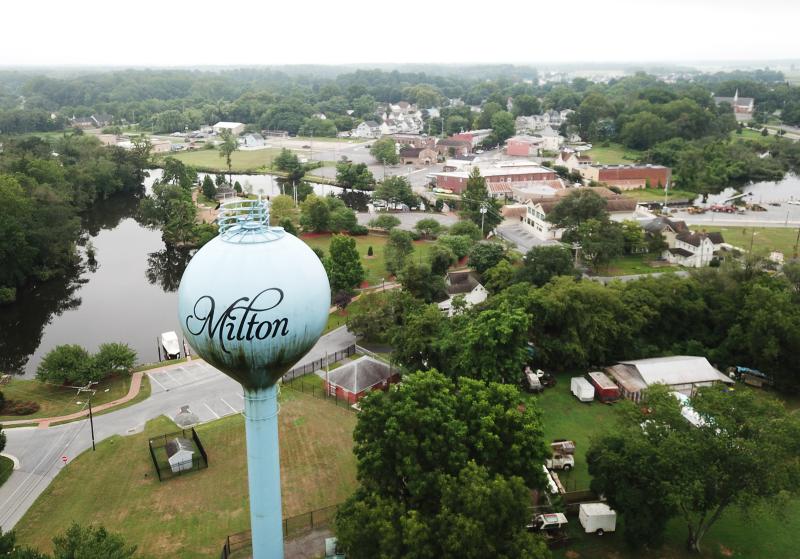Milton council passes marijuana ordinance

By a 5-1 vote, with one abstention, Milton Town Council approved an ordinance that would prohibit marijuana facilities and stores within town limits.
Under the ordinance, the operation of a marijuana cultivation facility, a marijuana product manufacturing facility, a marijuana testing facility, a retail marijuana store and a marijuana smoking lounge would each be prohibited within the municipal boundaries of Milton.
Town council passed the ordinance after a Sept. 9 public hearing; Councilwoman Randi Meredith was the only vote against the ordinance, while Vice Mayor Lee Revis-Plank abstained from voting.
The ordinance has been in the works since July, as the town sought to get ahead of the state beginning to issue licenses for outlets to begin the legal growing and sale of marijuana, which was legalized in 2023 through House Bill 1 and House Bill 2.
Under HB 1, the marijuana legalization bill, anyone 21 or older is allowed to possess up to 1 ounce of marijuana legally. The bill prohibits public consumption, allows businesses to drug test employees and have rules against its use, and continues to penalize drivers for operating vehicles under the influence of marijuana. The bill does, however, remove possession of marijuana from the list of activities that prohibit a person from possessing a handgun.
HB 2 creates a framework to tax and place fees on a marijuana industry, which includes funding a Justice Reinvestment Fund, under the management of the Department of Justice, which will be used for projects to improve quality of life for communities most impacted by the prohibition of marijuana and war on drugs-era policies. The bill also allows for 60 licenses to be issued in the first year, with 20 of them reserved for social equity applicants.
Under the law, municipalities are able to place prohibitions on how marijuana is regulated within their towns, and doing so gets much more complicated legally once licenses are issued.
The proposed regulations were reviewed by the planning and zoning commission, which recommended council approve the ordinance. In its report, the commission said that while the new law could create jobs and businesses in town, given the recency of the regulations and the unsettled nature of the industry in the state, the town would best be served at the moment by prohibiting marijuana establishments.
“As the industry and state regulators identify successes and failures with the facilities permitted in Sussex County and elsewhere in the state, the mayor and town council of Milton may elect to revisit the issue,” the report said.
During the public comment portion of the hearing, in an email, Jody Martin-Brown said she supported the ordinance.
Abby Graham said she believed marijuana-related facilities could help small businesses in town. Richard Wells echoed that sentiment, saying allowing marijuana facilities would bring new small businesses to Milton. Jean Duffy, whose family owns a medical marijuana consulting firm, said not allowing cannabis-related businesses and facilities is a missed opportunity for the town. She said cannabis helps improve public health and can be used as a tool to improve social and economic conditions.
Other commenters asked about the town’s ability to tax the sale of marijuana within its borders. Bill Burns said the town should allow the facilities, as it serves as an opportunity for the town to maximize its revenue sources.
“Anything that gets us legal revenue should be looked at. It shouldn’t be kicked down the road. I don’t think you should reject it out of hand,” he said.
Town Solicitor Seth Thompson said state regulations preempt local taxation, meaning the town could not tax sales of marijuana sold in town limits.
Councilman Scotty Edler said there is no revenue incentive for the town to allow marijuana facilities, and that the two big concerns with allowing these types of facilities is it would bring in lots of people and lots of cars. He said if the Legislature would allow for some kind of gross receipts tax or profit-sharing on marijuana, then it would be worth reconsidering.
Council agreed with that sentiment and moved forward with the ordinance, although Mayor John Collier said it was an issue that could be revisited in the future.
Ryan Mavity covers Milton and the court system. He is married to Rachel Swick Mavity and has two kids, Alex and Jane. Ryan started with the Cape Gazette all the way back in February 2007, previously covering the City of Rehoboth Beach. A native of Easton, Md. and graduate of Towson University, Ryan enjoys watching the Baltimore Ravens, Washington Capitals and Baltimore Orioles in his spare time.





















































